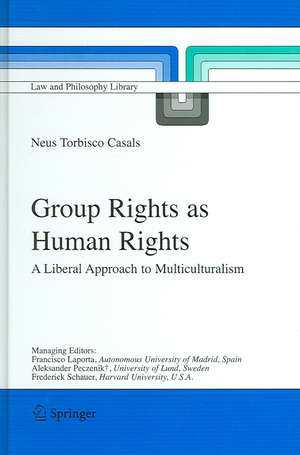Group Rights as Human Rights: A Liberal Approach to Multiculturalism: Law and Philosophy Library, cartea 75
Autor Neus Torbisco Casalsen Limba Engleză Hardback – 29 mar 2006
| Toate formatele și edițiile | Preț | Express |
|---|---|---|
| Paperback (1) | 639.73 lei 6-8 săpt. | |
| SPRINGER NETHERLANDS – 22 noi 2010 | 639.73 lei 6-8 săpt. | |
| Hardback (1) | 646.11 lei 6-8 săpt. | |
| SPRINGER NETHERLANDS – 29 mar 2006 | 646.11 lei 6-8 săpt. |
Din seria Law and Philosophy Library
- 20%
 Preț: 813.11 lei
Preț: 813.11 lei - 20%
 Preț: 569.00 lei
Preț: 569.00 lei - 18%
 Preț: 1225.16 lei
Preț: 1225.16 lei - 18%
 Preț: 950.66 lei
Preț: 950.66 lei - 15%
 Preț: 583.43 lei
Preț: 583.43 lei - 15%
 Preț: 639.25 lei
Preț: 639.25 lei - 15%
 Preț: 641.53 lei
Preț: 641.53 lei - 18%
 Preț: 893.84 lei
Preț: 893.84 lei - 24%
 Preț: 797.39 lei
Preț: 797.39 lei - 15%
 Preț: 579.84 lei
Preț: 579.84 lei - 15%
 Preț: 644.95 lei
Preț: 644.95 lei - 18%
 Preț: 895.76 lei
Preț: 895.76 lei - 15%
 Preț: 644.95 lei
Preț: 644.95 lei - 20%
 Preț: 571.85 lei
Preț: 571.85 lei - 15%
 Preț: 642.03 lei
Preț: 642.03 lei - 18%
 Preț: 1232.26 lei
Preț: 1232.26 lei - 18%
 Preț: 1116.05 lei
Preț: 1116.05 lei - 15%
 Preț: 655.92 lei
Preț: 655.92 lei - 18%
 Preț: 833.54 lei
Preț: 833.54 lei - 18%
 Preț: 898.26 lei
Preț: 898.26 lei - 18%
 Preț: 1016.63 lei
Preț: 1016.63 lei -
 Preț: 390.25 lei
Preț: 390.25 lei - 24%
 Preț: 700.89 lei
Preț: 700.89 lei - 18%
 Preț: 999.60 lei
Preț: 999.60 lei - 18%
 Preț: 1115.77 lei
Preț: 1115.77 lei - 18%
 Preț: 1107.88 lei
Preț: 1107.88 lei - 15%
 Preț: 637.46 lei
Preț: 637.46 lei - 18%
 Preț: 781.94 lei
Preț: 781.94 lei - 24%
 Preț: 815.54 lei
Preț: 815.54 lei - 18%
 Preț: 786.18 lei
Preț: 786.18 lei - 18%
 Preț: 735.21 lei
Preț: 735.21 lei - 15%
 Preț: 653.33 lei
Preț: 653.33 lei - 18%
 Preț: 782.10 lei
Preț: 782.10 lei
Preț: 646.11 lei
Preț vechi: 760.13 lei
-15% Nou
Puncte Express: 969
Preț estimativ în valută:
123.65€ • 134.26$ • 103.86£
123.65€ • 134.26$ • 103.86£
Carte tipărită la comandă
Livrare economică 22 aprilie-06 mai
Preluare comenzi: 021 569.72.76
Specificații
ISBN-13: 9781402042089
ISBN-10: 1402042086
Pagini: 278
Ilustrații: XVI, 263 p.
Dimensiuni: 210 x 297 x 21 mm
Greutate: 0.58 kg
Ediția:2006
Editura: SPRINGER NETHERLANDS
Colecția Springer
Seria Law and Philosophy Library
Locul publicării:Dordrecht, Netherlands
ISBN-10: 1402042086
Pagini: 278
Ilustrații: XVI, 263 p.
Dimensiuni: 210 x 297 x 21 mm
Greutate: 0.58 kg
Ediția:2006
Editura: SPRINGER NETHERLANDS
Colecția Springer
Seria Law and Philosophy Library
Locul publicării:Dordrecht, Netherlands
Public țintă
ResearchCuprins
Cultural Minorities and Group Rights: Contested Concepts.- Towards an Alternative Notion of Group Rights.- Understanding Multiculturalism: Which Groups Qualify.- Tolerance, Neutrality and Group Rights.- On the Relevance of Cultural Belonging: Group Rights as Instrumental Rights and as Fundamental Rights.- Multiculturalism, Ethnic Minorities and the Limits of Cultural Diversity.
Textul de pe ultima copertă
Liberal theories have long insisted that cultural diversity in democratic societies can be accommodated through classical liberal tools, in particular through individual rights, and they have often rejected the claims of cultural minorities for group rights as illiberal. Group Rights as Human Rights argues that such a rejection is misguided. Based on a thorough analysis of the concept of group rights, it proposes to overcome the dominant dichotomy between "individual" human rights and "collective" group rights by recognizing that group rights also serve individual interests. It also challenges the claim that group rights, so understood, conflict with the liberal principle of neutrality; on the contrary, these rights help realize the neutrality ideal as they counter cultural biases that exist in Western states. Group rights deserve to be classified as human rights because they respond to fundamental, and morally important, human interests. Reading the theories of Will Kymlicka and Charles Taylor as complementary rather than opposed, Group Rights as Human Rights sees group rights as anchored both in the value of cultural belonging for the development of individual autonomy and in each person’s need for a recognition of her identity. This double foundation has important consequences for the scope of group rights: it highlights their potential not only in dealing with national minorities but also with immigrant groups; and it allows to determine how far such rights should also benefit illiberal groups. Participation, not intervention, should here be the guiding principle if group rights are to realize the liberal promise.
Caracteristici
Group rights are a central issue in contemporary debates about multiculturalism in political and legal theory and practice Presents an in-depth analysis of group rights from the perspective of both contemporary legal and political theory Connects Anglo-American and continental European literature in the field Provides a thorough analysis of the major contributions to the field, in particular those of Kymlicka, Taylor and Raz, and integrates their approaches in an original way Presents a well-developed argument for a new approach to reconciling liberalism's commitments to both autonomy and respect for diversity














